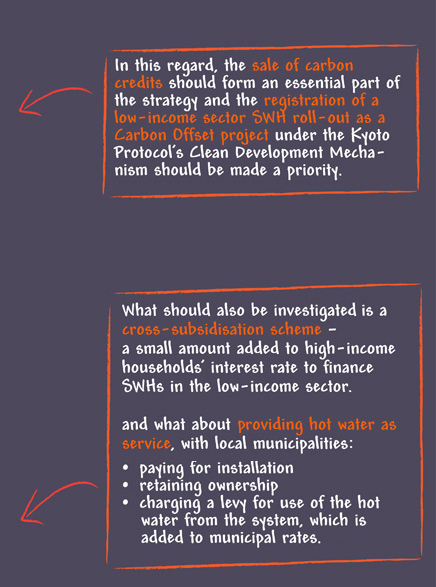|
| solar energy – integrating environmental and developmental concerns |
Solar water heaters (SWHs) can effectively replace conventional electrical geysers, kettles and other water heating methods used to provide hot water for household cleaning and personal hygiene in both high- and low-income homes. |
the case
- SWHs reduce the demand for electricity generated in coal-fired power stations
- thereby lessening emissions of harmful pollutants into the environment
- and mitigating against South Africa facing further electricity shortage crises by reducing peak demand
- SWHs create far more jobs than conventional power generating means
- lower energy consumption means lower electricity bills
- SWHs provide readily available hot water in low-income households that were previously reliant on time-consuming heating processes.
the opportunity
- SWHs offer government the means to achieve electrification targets
- much smaller increases in electricity supply required
- in high-income groups SWHs offer long-term savings and environmental benefits
- in low-income communities, similar benefits are provided, as well as drastic improvements in peoples’ quality of life.
So, although SWHs make more environmental and economic sense for high-income consumers, they offer important developmental service for poor users without harm to the environment.
Therefore, solar energy can act as a powerful agent to reduce inequality in society through a technology that provides significant social upliftment opportunities.
the benefits
- The energy that could be saved through SWHs is comparable to that produced by a small 300MW power station
- These savings are particularly valuable since
- a significant part would occur in peak electricity demand periods when national supply is shortest and generation most expensive, at up to R2.50/kWh for gas or diesel power generation
- during this time, residential electricity use accounts for up to 30% of demand. (Eskom (2009) 'Residential Load Management FAQ')
- savings would reduce residential electricity demand by roughly 18%.
what SWHs have got going for them
- It is a well-established industry in South Africa
- Scale-up would ensure significant job creation,especially amongst semi-skilled individuals
- It provides a key entry point into ‘green economy’ development by addressing environmental and developmental needs.
what still needs attention in terms of implementation
- The industry is relatively small in terms of output
- The up-front installation costs are too high for most, but especially for low-income households
- Government policy and subsidy support are required to see the technology rolled out successfully.
|
 |
Gauteng’s proposed 2025 SWH targets (from the Department of Local Government and Housing, 'Gauteng Integrated Energy Strategy')
- 95% of mid- to high-income households (0.8% population growth) 1 266 393 systems installed (from City of Johannesburg (2007) 'Spatial Development Framework')
- 50% of low-income households (0.8% population growth) 666 522 systems installed
(58% of the households in the province are classed in LSM 1-6 (Holm 2005) and the assumption is that this figure will fall to around 50% by 2025 if development targets are achieved)
The GCRO’s 2009 'Quality of Life' survey estimates that less than 0.1% of Gauteng residents currently use a solar water heater.
|
| |
what do we recommend to achieve the targeted roll-out? |
- By-laws should be promulgated that make SWH installation compulsory
- when existing electrical geysers break down
- on all newly built middle- to high-income market houses
- SWHs should be included in all new government-subsidised housing projects
- Existing housing projects should be gradually retrofitted
- retrofitting can be undertaken as part of the Community Employment Programme (CEP)
- with young people with matric or Higher Education being recruited, trained and qualified to install and maintain SWHs by the CEP
- once qualified in maintenance, graduates can be helped to set up their own SMMEs to provide SWH maintenance and more general, related plumbing and electrical services
- The local SWH industry should be supported to ensure maximum economic development, through
- a subsidy scheme to local manufacturers to kick-start the sector; or
- a preferential procurement system supporting locally made systems once the sector is established
- A critical factor in the successful roll-out of SWHs as a green economy initiative is the development of a financing scheme for the retrofitting of homes –
- this could be included in the rates and taxes; or
- as separate from local municipalities.
|
 |
| |
|



